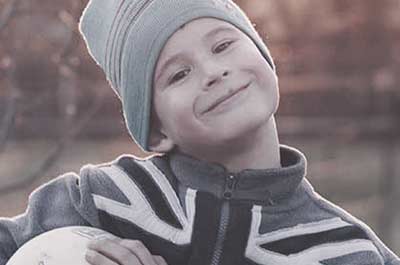Being confident in yourself and your abilities is not an inborn characteristic. It is something that must be taught. But when parents actively teach their children skills they can apply when they are in challenging or uncertain situations, they give their children the tools they need to be independent and confident in themselves.
Here are ten things parents can do to raise a self-confident child.
Let your child experience failure.
It is impossible to overstate the importance of children experiencing failure in their early years. They must learn how to deal with it in healthy ways, or else they will carry feelings of inadequacy with them throughout their entire lives.

If you avoid or minimize your children’s failures, they will never truly learn to deal with them on their own. Instead, they will become overly concerned with what others think of them and freeze them with a feeling of being incompetent.
Don’t force your children to be the best. Instead, let them pursue their interests and allow them to fail when they try to do something they are not good at.
If you constantly tell your child he is excellent just for showing up; he will start to believe you and stop trying.
On the other hand, if he fails often and you cheer him on and tell him it is OK to fail, he will learn to have the confidence to try again and will be less likely to become a “Monday-morning quarterback” as an adult and criticize himself for things he did as a child.
The world is becoming increasingly competitive, and children are being raised with a sense of “I’m special, you’re not.” It creates a generation of kids who believe they should be entitled to everything and become extremely angry and bitter when they don’t get it.
Don’t be afraid to express your feelings.
Many parents are too afraid to express their feelings for fear their child will never understand. Or worse still, they will become confused and think there is something wrong with them.
Nothing could be further from the truth. Children learn far more from what their parents feel than they do from any ‘preachy’ message. By expressing feelings, you will build a stronger bond with your child and give them the self-assurance to succeed in life.
Show your children by your actions that it is OK to express feelings and that people don’t have to be tough all the time. It will give them the confidence to deal with difficult situations in their lives.
Have fun! Expressing feelings can be one of the most enjoyable aspects of parenting. The most important thing is to make sure you are representing the right feelings.
If you are angry with your child, don’t yell. Yelling only teaches them to obey commands, not to learn anything about how to solve problems. Instead, express your feelings calmly and rationally. Remember, the goal is not to punish your child but rather to help them grow.
Therefore, when you express your feelings, try to do so in a non-threatening way. And remember, it is far better to teach your children by example than by word. So have some fun with this.
Don’t compare your children to others.
Don’t compare your children to others. You’ll put them down in an instant. Your child will never be as good or as fast as another kid. They may not even be as ‘good’ as your own childhood self.
Your child will always be unique.

Do you want your child to have confidence? Do you want them to be able to ‘own’ their achievements and know they are enough? Then stop comparing them to others. Stop telling them how their siblings are doing better than them.
Encourage them to follow their dreams. Let them know it’s OK to make mistakes and that you will always be there to help them get back on track.
However, be aware that children are constantly comparing themselves to their peers. The problem is that they are comparing themselves based on appearances rather than on reality.
You must help them understand that everyone is different and no two people are exactly alike.
Don’t encourage your children to compare themselves to others. It would be best if you were promoting your child to be confident in themself. To have faith in their abilities. This will serve your child well for the rest of their life.
Give honest but kind feedback.
Give your child honest but kind feedback. Don’t say things like, “You can’t do anything right.” That doesn’t help your child at all. Instead, try saying things like, “I think you did a good job on that, but let’s see if you can improve it a little bit. How would you change it?”
Don’t give him critical feedback unless you are willing to follow it up with positive reinforcement. Compliment him for the things you do like. The goal here is to help your child develop self-awareness so he can make necessary corrections for future performances.
If he gets an answer wrong, don’t tell him he didn’t know the answer or that he should have known it. Instead, ask him if he has any questions.
Let him get it wrong once or twice, and then correct him. Don’t correct him every time he makes a mistake. That will cause him to become afraid to try anything at all.
Model good sportsmanship.
Children raised in homes with active, engaged parents are more likely to possess qualities such as good sportsmanship and the ability to work well with others.
When a child sees his parents actively involved in other people’s lives, helping and not just focusing on their problems, the child learns that life is about working together with other people, not just competing against them.
Teach your child that it is OK to lose and to treat his opponent with courtesy. This will serve him well in all areas of his life. He will be able to adapt better when things don’t go his way and will be able to bounce back more quickly from disappointments.
Don’t force your child to be something he’s not.
A great way to raise a self-confident kid is by encouraging him in his natural interests and strengths. Don’t try to force your child to be something he’s not, but don’t let him hide his light under a basket, either. Let him shine!
When your child is young, you can help him develop confidence by exposing him to as many opportunities as possible to use his gifts and express his creativity.
Kids who are confident in their abilities tend to have more self-esteem and be less prone to feelings of inadequacy. Plus, kids with high self-esteem are more likely to succeed in school and life.
Help him discover his passions and strengths. Then, support him in developing these areas to the fullest extent possible.
Don’t try to turn your child into a doctor or a lawyer – just because you would like them to have that education. No good can come from forcing your child to do something he is not cut out for.
Instead, help him find his passion and follow that to the best of his ability.
Give him choices.
“Do you want a bagel or a doughnut?”, “Shall we watch ‘The Lion King’ or ‘Frozen’?”, “Would you like to go shopping, or do you have other plans?” Etc., etc.
Giving your child choices makes him feel like he has some control over his own life. It will also help develop his confidence.
You might think you’re a great parent by limiting your child’s options, but in fact, this will stunt his growth and rob him of the opportunity to learn to make decisions for himself. Let him choose between two or more things every once in a while, and explain why you are giving him the options.
There are many different ways to develop intelligence, and none of them include simplifying your child’s life. Give your child choices, and then help him to explore his options intelligently. That means you should help him explore the pros and cons of each choice and explain to him why you have made the choices you have.
A child needs to be curious. Ignorance is the enemy of intelligence. If you want your child to grow up to be an intelligent, self-confident adult, you must stimulate his curiosity from an early age.
Set realistic goals for children.
Most kids are never really “good” at anything. They’ll never be great athletes, singers, or artists. That’s not what parents should strive for. But most parents set goals that are way too high for their kids. Like “your child needs to be a star athlete” or “you should enter your child in the county fair painting contest.”
We can’t all be geniuses like Mozart or Einstein. And some of us (like me) don’t have the natural talent to be even mediocre at anything. So what should we do? Should we just throw up our hands and accept that our kids are going to be average? No. We should strive for our kids to be…
Confident!
Set realistic goals for children? What do you mean? Don’t set them too high. You want them to have a better chance of success in life, don’t you? Don’t set them too low, either.
Children need to be challenged…
… but not so far above their ability that they feel they are wasting their time. Find that middle road that gives them the best shot at a balanced life.
Children don’t have enough goal-setting skills. They hadn’t grown up in an era when most adults had clearly defined goals for themselves.
What does it say about us as a society that none of us can set goals for ourselves? Without goals, how can we ever hope to be successful?
Give your child a simple written list of SMART (Specific, Measurable, Attainable, Relevant, and Time-bound) goals and help him define realistic but challenging targets. Don’t worry if this seems like a lot of work at first. Once your child starts setting goals himself, the process will take on a life of its own, and the flow will be constant.
Don’t Underestimate Your Child.
Many parents are quick to tell their children they don’t have any talent or ability when that is not true. It is never too early to help your child develop self-esteem. The earlier, the better.
Children need positive role models from early on in their lives. If you constantly tell them they are dumb, stupid, no good, etc., they will believe it and carry those negative feelings into adulthood.
We all know how smart our kids are. They may be innately brilliant, but, more often than not, they lack self-esteem. When that happens, it can affect their schoolwork, their social life, and even their health. It’s no wonder many experts believe low self-esteem is one of the most pervasive problems in our culture.
And, it’s something you must help your child overcome if they are to have a bright future.
When it comes to their children, most parents are reluctant to give positive reinforcement. They feel that somehow it will encourage the child to be conceited. On the other hand, constant criticism has the opposite effect. It makes a person feel inferior and without any self-esteem.
What you should do is provide a balance of both. Give your child positive feedback, but don’t let him get away with anything.
Praise the effort, not the achievement.
Self-esteem is one of the essential ingredients needed for a child’s healthy development.
Unfortunately, many parents focus almost exclusively on their children’s grades, test scores, and sports accomplishments. These are all important, but they are only part of the equation. A parent’s consistent, non-judgmental praise of a child’s positive efforts is just as critical (if not more) than the child’s actual grades and sports results.
Grades and test scores are influenced by many outside factors, such as the teacher, the school, the parents of other students, and even the weather. On the other hand, praise for effort is something each individual can do, no matter what.
And, when a child receives praise for an endeavor that they have put forth some effort, this praise has a much more positive influence than simply praising a child for a grade or test score.
Praising for effort is critical at an early age because it helps a child develop the self-esteem necessary to face challenges later in life.
Conclusion.
Self-confident children have an enormous advantage over children who are not. They have the confidence to try new things, take risks, and believe in themselves. Help your child develop self-confidence by modeling it and teaching your child by example to believe in himself.

Meet Marcella Raskin: Founder, Editor-in-Chief, and a Maven in Human Potential
Dive into the rich tapestry of Marcella Raskin’s life and you’ll discover more than just an editor-in-chief. At the core, Marcella is a passionate writer, deeply committed to unlocking the boundless human potential. Armed with expertise in Cognitive Behavioral Therapy, Life Purpose Coaching, and Group Life Coaching, she’s carved a niche in helping both women and men unearth their true selves through the art of writing. Every article she pens is a gateway, inviting readers to shift mindsets and embrace transformation, even when change seems impossible.
Beyond her literary pursuits, Marcella is a fitness enthusiast, underpinned by her background in Exercise Physiology. And when she’s not empowering others or delving into the science of movement, she’s reveling in the joys of motherhood, raising two incredible girls, and sharing life’s moments with her beloved spouse.
Trust Marcella’s words; they’re backed by expertise, passion, and a journey full of learning and growth.
Reviewed By: Joanna Perez and Brenda Tillman
Edited By: Lenny Terra
Fact Checked By: Matthew Mansour
Photos Taken or Curated By: Matthew Mansour